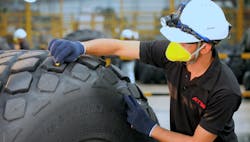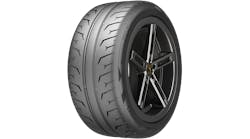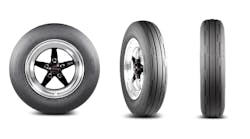Next year should be a good one for the ag tire market in North America, according to Nick Phillippi, national product manager, agriculture, Alliance Tire Americas Inc. "I think we'll see a nice bump in farmers' investment in equipment in 2021, whether it's in new machinery sales or in buying good used machines," he says.
"There should be some pent-up demand in the market and, fingers crossed, if we don’t have any major events, 2021 should be a strong year for farm tires."
In this interview, Phillippi discusses the impact of COVID-19 on Alliance's ag tire business in the U.S. and Canada, current ag tire demand and more.
MTD: How has the COVID-19 pandemic impacted your ag tire business in North America?
Phillippi: Farmers have done a great job of keeping North America and the world supplied with food, feed, fuel and fiber despite the pandemic, which means their equipment has been rolling this whole time - and we and our dealers have been keeping them supplied with tires.
Our supply of tires to the North American agriculture market remained very stable in spite of the nationally mandated shutdown of our factories in Tirunelveli and Dahej, India, for about three weeks in the spring as part of a national COVID-19 lockdown. That shutdown affected our bias-ply and conventional radial farm tire production to some extent. But our high-tech VF (very high flexion), IF (increased flexion) and flotation radial tires are made at our plant in Hadera, Israel, which remained in production, so there was no interruption in the supply of those farm tires.
The team at the Israel factory was also able to manufacture some tires that would have otherwise been made in India, helping keep the supplies flowing - not just in farm tires, but in other OTR categories, too. And when it came time to re-start the India factories, our manufacturing teams got back up and running very efficiently, which really helped minimize the impact of the interruption. Backlogs at the ports and some shipping interruptions around the globe may have affected tire supplies more than tire manufacturers.
At the same time, on the OE side, there was some slowdown in the farm equipment market. Part of that was probably the impact of the early stages of the pandemic lockdown, especially for pork and some dairy producers, where supply chains had ground to a halt and left them with little or no outlet for their products. But I think more of it had to do with overall poor margins in agriculture, which cleared up as the year went on.
I believe that some buying decisions by dealers to decrease direct large orders and to really watch inventory to see what the outcomes were going to be took place. With some restrictions of imported tires and some slowdowns in raw materials, I think dealers did find some short supplies of product in late- June into September.
MTD: Can you describe the current state of overall ag tire demand in the U.S. and Canada?
Phillippi: We saw some slowdown in the sales of new farm machinery on the OE side, partly because of COVID-19 and probably even more because of uncertainty about commodity prices. We had an active trade war going on with China and farmers were watching to see if China would keep its promises about buying U.S. farm products, and we had all kinds of competition from foreign producers. But between USDA funds to make up for the effects of the trade war and additional money to address the market effects of COVID-19, the federal government put as much as $40 billion into the farm economy this year. That has certainly helped farmers' situation in a very strange year.
The latest figures for U.S. farm machinery sales I've seen show a pattern we've seen a lot of the past several years, with smaller tractors doing really well, over-100-horsepower, two-wheel-drive tractors down a bit and large, four-wheel-drive tractors and combines up a little. Canadian farm equipment sales were down quite a bit compared to U.S. sales, with bigger drops in 100-horsepower-plus tractors and combines than we saw here.
When farmers keep their current machines running an extra season or two or invest in used equipment, we pick up replacement tire business. Our farm replacement tire business, which helps farmers get more life out of their older machinery, has gone very well over the past several years, and this year was no different.
Like with everything else in agriculture, we can't make across-the-board statements. Cotton farmers are hurting, between poor prices, low acres, hurricanes and predictions that as much as 25% of the cotton crop this year is not even going to get harvested. Mother Nature was tough on some areas in the Midwest, with drought and damaging winds. Hog markets have found their way back to normal over the past few months, but pork producers had a really rough year. So while we're really happy for so many of our customers, we know many others are still having a tough time.
MTD: What will 2021 look like?
Phillippi: I think we'll see a nice bump in farmers' investment in equipment in 2021, whether it's in new machinery sales or in buying good used machines. There should be some pent-up demand in the market and, fingers crossed, if we don’t have any major events, 2021 should be a strong year for farm tires.
We're also expecting significant increases in our replacement tire sales for 2021. And we're very excited about a couple of recent introductions, including 12 sizes of the new Galaxy Garden Pro XTD for compact tractors - the fastest-growing sector of the tractor market - and the Galaxy truck tire line, which offers great options for farmers with regional-haul tires and what we're calling our construction truck line, which is great for gravel and off-road use, as well as pavement.
One of the things about farms is that they are full of tires. So when we think about farmers, we immediately think of tractor and combine tires. But most of them have also got all sorts of implements, loaders, skid steers, semis, pickups and cars in their yard that need tires, too.
MTD: What trends should ag tire dealers monitor as the new year begins?
Phillippi: Of course, the most basic driver is whether farmers are making money. Another COVID-19 lockdown would be rough on the farm economy, especially in its effects on food service supply chains like we saw this year. I'll be watching the commodity markets to see whether crop prices stay decent and watching the news to see how trade is going with China and our other overseas customers. And I'll be watching the reports from the Association of Equipment Manufacturers to see how machinery sales are going.
But most of all, ag tire dealers should be listening to what their customers are saying. Are they buying machinery? Do their customers understand what IF and VF technology can mean to their business? If they're worried about a wet spring, do those farmers know how to use inflation pressure and VF technology to improve flotation and reduce soil compaction?
And most of all, are they getting the service they want from their tire dealer? Tires are so vital to farmers' livelihoods that they really represent a great opportunity for a tire dealer to shine - to provide that extra expertise on new products and service that makes them stand out.




